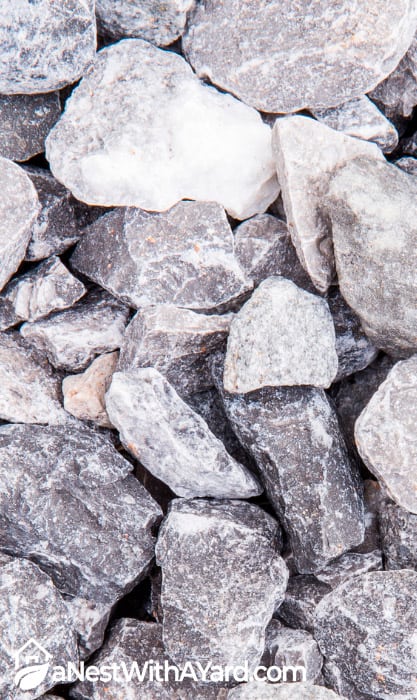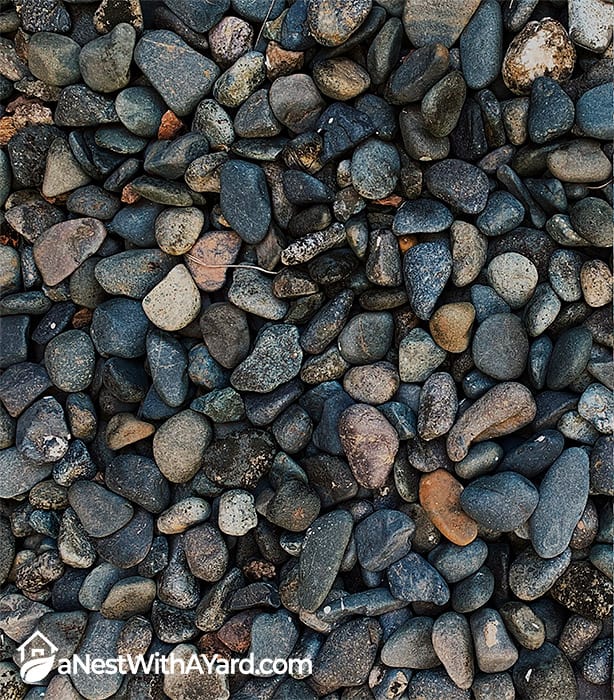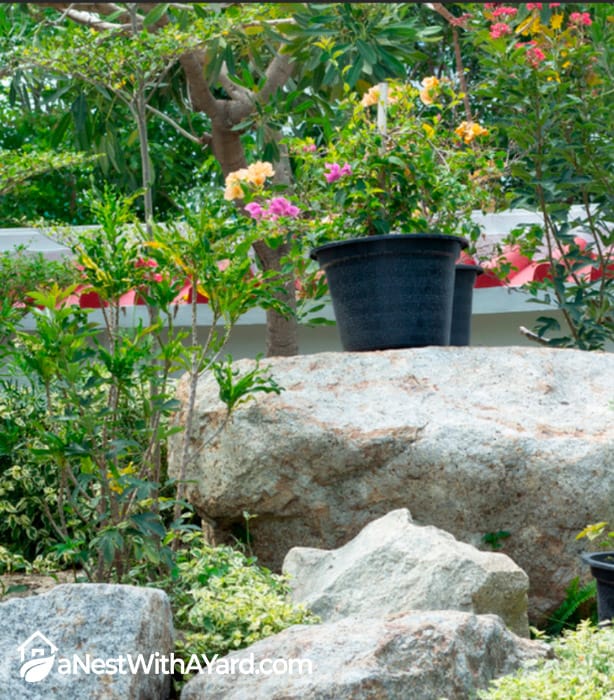Looking for a way to elevate your yard or outdoor space? The addition of landscaping materials, such as different rocks and stones can turn an average backyard into what feels like a vacation getaway.
This guide will dive into the different types of stones and rocks available to use in unique landscaping projects. Additionally, we will discuss how these new additions can play a functional role while also transforming an average space.
Contents
Different Types of Landscaping Stone
You may be asking yourself what are the best types of stones and rocks to use for enhancing a landscape. Whether it’s preference, functionality, or cost, we’ll look into all of the top different options most commonly used in upgrading landscape spaces, as well as provide insights on their pros and cons.
Crushed Stone
One of the most popular types of landscaping material is crushed stone. This typically is made from granite, though other options like gravel and limestone are available to provide different functional purposes.
Types of Crushed Stone
Crushed Granite

This is the most common type of crushed stone. It is quite popular due to its color availability and overall durability. Crushed granite is used in a variety of spaces including driveways, sidewalks, and garden beds to provide a solid structure from plants sinking in mulch.
Crushed Limestone

Similar to granite, limestone is another great option to elevate walkways, sidewalks, or any outdoor space. Limestone has fewer color options, but if you are looking for something light and elegant, it can be the perfect choice.
Crushed Gravel

Crushed gravel is seen most commonly in more natural landscapes. It is available in a wide variety of sizes to accommodate the location in which it will be used. Gravel is most typically seen in gardens as a decorative element.
Where Can Crushed Stone Be Used?
Sidewalks and Driveways
Any type of crushed stone can be a great option for a walkway or driveway as it can be compacted and well-defined into those types of spaces, while still offering the durability needed to withstand constant walking or heavy objects over it.
It looks great combined with mulch.
Gardens
Crushed stone is a great option if you are looking for a functional garden. Most times gardens can be impacted by severe weather or just by people mistakenly walking on them. Crushed stone can help protect your plants by giving them some structure, or making them more visible to those walking through.
Decorative Elements
If you are just looking to spice up your landscape, crushed stone can be a convenient option. It’s great to add to gardens or walkways to enhance the focal points of your yard or space.
New England River Rock
Besides crushed stone, New England river rock is a unique option for any landscape. These rocks are typically smooth and rounded due to the erosion and currents around them when they were underwater.
While New England River Rock was originally a popular option in the North East, it has recently become very popular. Homeowners shopping for landscaping stones in Georgia all the way to Florida have been considering this river rock, while historically other types of stone have been the go-to choice. River Rock is also available in a wide color variety as well as size options to fit specific needs.
Sizes of New England River Rock
Small

Smaller river rock typically consists of pebble-sized stones. These pebbles are used for functional purposes in landscapes to provide optimal drainage. While they are functional, some also appreciate their visual appearance and use it to highlight focal points in their yard.
Medium

Medium-sized river rocks have different functional purposes than smaller pebbles. This size is ideal to use on sidewalks or any type of walkway as it is more durable. Additionally, the larger size is more appealing as a decorative element.
Large
The largest type of river rock available is typically used only for decorative purposes. Most use it to outline gardens or small bodies of water.
Where Can New England River Rock Be Used?
Sidewalks and Pathways
Smaller to medium-sized new england river rock is a great choice for sidewalks or any area people may be walking through. It is durable enough to withstand constant walking while also enhancing the walkway itself.
Erosion Control
Larger rocks can be placed near slopes or around bodies of water to help stabilize the soil underneath and control natural erosion. They are great for dry river beds as well.
Gardens and Water
Medium to larger-sized rocks are perfect to use to outline plants in your garden, or smaller bodies of water so no one accidentally steps in them. Functionally, river rocks can also act as a natural filtration system for these small rivers or ponds.
Pea Gravel
Pea gravel is another versatile landscaping material. It consists of tiny pea-shaped, rounded rocks that are available in multiple colors.
Common Types of Pea Gravel
Standard

Standard pea gravel is the most common type, it is usually pretty small in size ranging from 1/8 to 3/8 inches in diameter. The color is also pretty consistent in standard pea gravel, creating a uniform look.
Mixed

Mixed pea gravel has more of a range in both size and color as it combines different standard gravel into one mix. While others prefer a more uniform look, mixed pea gravel offers a different kind of visually appealing stone.
Where Can Pea Gravel Be Used?
Play Areas
Some play areas have benefited from a functional and aesthetic standpoint by using pea gravel. Its smaller size makes it suitable for rowdy play areas while still keeping a clean look.
Drains
Smaller-sized pea gravel is a great choice for drains. The small size helps prevent water accumulation without causing buildup.
Zen Gardens
Due to the smooth and smaller size of pea gravel it tends to be a popular choice for soothing zen gardens.
Lawn Edging
Small pea gravel looks great as a lawn edging option thanks to its natural round shape that contrasts with sharp blades of grass.
Boulders
One of the most eye-catching additions is landscaping boulders. They are available in a variety of colors, sizes, and textures to fit your specific needs.
Common Types of Boulders

Granite Boulders
Granite boulders are most commonly used as focal point additions to any landscape as well as acting as structures for walls. Their durability makes them quite functional when offering support. Smaller granite boulders can also be used as stepping stones throughout a yard.
Sandstone Boulders
These types of boulders offer a more rustic and natural look. They are great additions to bodies of water, or gardens.
Limestone Boulders
These types of boulders are one of the most elegant materials to add to any landscape. They offer a very visually appealing look and are commonly used as centerpiece elements in a yard.
Where Can Boulders Be Used?

Gardens
Any type of boulder can be placed in a garden to create an eye-catching centerpiece. Boulders are also typically seen in Japanese gardens as they represent tranquility, strength, and stability. They are also great for landscaping in drought-prone areas.
Landscapes
Often, people place boulders in more naturalistic landscapes to mimic natural rock formations. These boulders seamlessly fit in and make the landscape come together.
Water Features
Boulders are also commonly seen in pools, ponds, or any body of water you want to elevate.
Choosing Which Stone Works Best For You
Though all the stones above offer great aesthetics and functionalities to any landscape to add a lot to curb appeal, it is important to consider which ones will work best for your specific space. For example, if you are looking for something durable to use as a walkway or a driveway, your options for stone become more limited.
You then must consider if those stone options are available in the colors, sizes, and look you are wanting for that specific space. Different stones offer different textures and appearances. More natural options could be river rock and pea gravel, while crushed limestone could offer a more elegant appeal.
In conclusion, selecting the right stone for your landscaping projects is a crucial decision that requires careful consideration. By understanding the different options available, such as crushed stone, river rock, and boulders, you can make an informed choice based on factors like functionality, durability, and aesthetic appeal.
